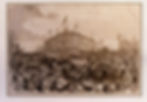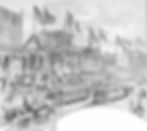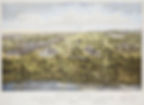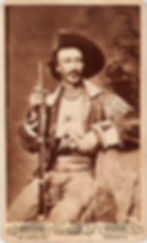Texas Jack at the Centennial
- Matthew Kerns
- Sep 8, 2022
- 4 min read
Updated: Sep 30, 2022
Texas Jack made big plans for the 1876 American Centennial celebration in Philadelphia, with no way of knowing that just about everything that could go wrong would go wrong.

When Buffalo Bill Cody's son died suddenly from scarlet fever in the middle of their 1875 tour, it took the wind out of Cody's dramatic sails. He told his friend Texas Jack that he was done with acting—that he wanted to head back west, return to his former life as a scout, and spend some time with his wife and daughters. Jack understood, and wished his best friend and partner well as he planned his own exit from the constant touring of the last five years. Jack wanted to settle into a life split between quiet marital bliss with his wife at their Massachusetts farmhouse and summer trips to the wildest parts of the American West. He determined the best way to ensure his family's financial future was to make a big investment at the Centennial.
Texas Jack partnered with two other men, Erb & Lafferty, to build and open a Wild West-themed hotel on Elm Street, just across from the main entrance to the Centennial grounds at Philadelphia's Fairmount Park. In addition to supplying money for the investment, Jack sent to the hotel many of his own weapons and trappings of frontier life. Patrons could fire Texas Jack’s guns at the indoor shooting gallery before retiring to the saloon, which was well stocked with wines, lagers, ales, and whiskies. The manager of Texas Jack and Buffalo Bill's show, John M. Burke, dressed in the wide-brimmed hat and fringed leathers of his scout friends, assisted in the attraction’s operations.

Omohundro planned on staying in Philadelphia throughout the Centennial Exhibition, buying for himself and his wife a house at 614 North 44th Street, just a mile from his hotel on Elm Avenue. Morlacchi was engaged to perform both The Black Crook and The French Spy at the city’s New National Theatre for the duration of the centennial celebration.
Texas Jack was in Philadelphia as the Centennial proceedings got underway. On June 5, Texas Jack was present, “sporting a huge sombrero,” to watch a man attempt to ride his horse sixty-five miles in under three hours. At the end of June, Jack represented himself at the trial of a man who had stolen one of the cowboy’s guns from his new hotel. A notice in the Philadelphia Times about a legal proceeding in small claims court in the city details the incident:
"Thomas Murphy, a stranger in this city, was arraigned on the charge of stealing “a silver mounted barking iron” from "The Hunter's Home” a saloon in the vicinity of the Centennial Buildings. “Texas Jack” proprietor of that ranche [sic], was in attendance as the prosecutor. The trial went over, however, as the accused asked for time to send for money to retain a lawyer."

The Times also reported that “Buffalo Bill was in Philadelphia on or about the 4th of July. He has been engaged in no business, but has been interested in the support of the Indians at the Hunter's Home .” The Indians in question were Jack's future dramatic partner Donald McKay, his Warm Springs Scouts, and perhaps half a dozen Cherokee.
Texas Jack and Buffalo Bill did not spend the remainder of their summer in Philadelphia. As the date of the nation’s centennial approached, so did news about the defeat of General Custer at the hands of the Sioux and Cheyenne at Little Bighorn. Both of the scouts headed west to join the conflict, Cody to General Crook in Wyoming, and Omohundro, to General Terry in South Dakota. Working both as a scout for Terry and occasionally submitting reports on the action to the New York Herald, Jack would not return to Philadelphia until late October. On September 8, 1876, while Texas Jack rode up the Yellowstone River with General Terry, the San Francisco Daily Evening Bulletin filed a story about the bustling life on Elm Avenue opposite the Centennial grounds.
"The side-shows have picked up wonderfully during the last few weeks. A great impulse has been given to business in this direction. It is 9 o’clock in the evening and Elm avenue is in full blast. On the other side of the street is the main exhibition building, dimly lit here and there, silent and deserted. So is the sidewalk fronting it. Over the way is seen a long range of wooden buildings. Their fronts are of many and incongruous styles of architecture. No two are alike; the entrances are in many cases without doors or windows; the life within is plainly seen; there are lights, red and blue and green; flaring oil lamps and calciums darting their brilliant rays up and down the street. Cross over. The sidewalk is densely thronged.
For half a mile there is a succession of saloons, beer gardens, free minstrel shows, shooting galleries, hotels, restaurants and scores of other localities and appliances for amusing and comforting humanity. There is little of the more sober and practical business of life done here; no marketing, no buying of clothes or provisions. This is a Centennial crowd. They are gathered from all quarters, and bent only on enjoying themselves. Nor is this Philadelphia. It is a city by itself—a city of the Centennial. . . . Here is the saloon of Texas Jack: The hunter's Home," with many life-size woodcuts of Texas Jack pasted on the walls. Texas Jack, rifle in hand! Texas Jack, swinging the riots. Within sits an Indian woman in a brilliant red costume adorned with beads and furs; without is a burly Indian, still more brilliant in red leggings, hunting shirt and headdress of feathers. On the curb another Indian, more glaring still in red, silently offering bead-work for sale."
Business was booming, and though Texas Jack was far away from his hotel, the investment he had sunk so much of his fortune into, he had high hopes that the success of the Hunter's Home would afford him the time and ability to stop the constant touring that had occupied so much of his life for the last five years. He wanted to spend time with his wife. He wanted to start a family.

Unfortunately for Texas Jack, while he was far away answering the call of his country, tragedy was lurking closer to home.
[To be continued.]
